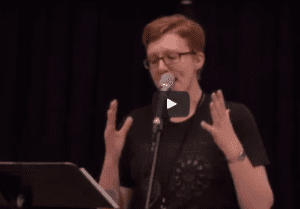
By Richard Bauman
Driving through the supermarket parking lot I almost ran over a woman hurrying from the store to her car. I had made a mistake: I was looking to the left and turning right when she charged out of the store, pushing an overflowing shopping cart almost directly in front of my car.
I barely missed hitting her.
Fortunately, she saw me and stopped just as I skimmed by. She yelled something at me, which I didn’t understand through the closed car window. But she left no doubt she was angry over my negligence.
Instantly, I seethed with anger, too. It was her fault, not mine, my mind told me. In that nanosecond of time I rationalized that if she hadn’t rushed into the parking lot, and if she had been paying attention, she wouldn’t have nearly walked in front of me.
My hand was on the window crank and I was starting to roll down the window to shout back at her, but I stopped.
While she might have erred in thinking that I saw her and I would stop, I had blundered, too. Turning in one direction while looking the opposite way was not driving safely.
I parked my car an aisle away from hers. Not sure what I was going to say, let alone what she was going to tell me, I quickly prayed: “God, please give me the words to heal this situation.” Then I walked toward her.
She saw me coming and her jaw set tight, her eyes bore into me and her expression told me she was going to let me have it. I’m certain she thought I was going to verbally blast her, thus she seemed eager to get in the first volley.
“I’m going to report this,” she shouted. “Don’t think I won’t. Just watch and see.”
With calmness that belied the tightness in my chest, I said, “I just wanted to tell you I am sorry that I scared you. I didn’t see you right away.”
With calmness that belied the tightness in my chest, I said, “I just wanted to tell you I am sorry that I scared you. I didn’t see you right away.”
Her eyes opened wide, and her jaw dropped a little. It was as if she was hearing something she couldn’t believe. With a little less sharpness in her voice, she responded, “Well, I thought you did it on purpose.”
“No. I just didn’t see you,” I reiterated. “I was looking the wrong way when I turned. I am sorry I scared you.”
In a voice several decibels lower, and calmer, she thanked me for apologizing. I said goodnight, and walked back to my car.
I wish I could say peace and serenity filled my heart. Not so. I was piqued she hadn’t recognized her mistake and apologized for her part in the incident. I was surprised by the hostility I felt toward her because apparently she wasn’t sorry for her actions.
I know it isn’t unusual to feel animosity toward others, even when we are at fault. But I also know I don’t have to act on those feelings.
I’m sure there are numerous places in Scripture that address my ill will, but two I especially like are:
“Love your enemies, do good to those who hate you, bless those who curse you, pray for those who mistreat you.” (Luke 6:27)
and
“Be kind to one another, tenderhearted, forgiving one another, as God in Christ forgave you.” (Ephesians 4:32)
I pray that each time I err I will recognize it, have to courage to promptly admit it, and accept the other person’s response—no matter what it might be.
Richard Bauman is a freelance writer from West Covina, California. He has authored five books: Awe-Full Moments: Spirituality in the Commonplace, It Made a Difference to that One, Holy Humor: If This is Church, Why are we Laughing?, Bible Oddities, and Women of the Bible: A Quiz Book.



3 Responses
Great example of the Love and Ministry of Jesus Christ. “WWJD = Watch What Jesus Does.”
Cynthia Williams, Palmer Theological Seminary Student .
Richard,
Really enjoyed your “Parking Lot Apology” piece. As an Expat American having lived abroad most of my life, I’ve lost count of the number of times similar situations have arisen in my daily perambulations. Whether on foot or commuting by car, when one lives in intensely crowed areas – 13,000 pmi² as it is here in London, these types of scenarios are statistically bound to happen more frequently. If one lets their attention drift for even half a second, while walking on the pavement (aka: sidewalk) or driving, into that space will instantaneously slip a hoard of other encumbering malefactors – ha! It’s just the reality of the crowed planet we now live on.
Keeping ones spiritual cool in a world where you never, ever can simply travel from A to B without 14 million continuous interruptions or potential conflicts, has got to be one of the heaviest Post-modern ‘crosses’ we all have to bear. If we think our space is our own, along with the air we feel we’re entitled to breathe – guess again! As a believer, having that ‘Paraclete’ on our shoulder guiding us spiritually throughout the day, is literally a Godsend to avoiding infantile and unnecessary temper spasms and wrangles. It takes a monumental faith to walk away from directed insults and obscenely selfish behaviors that get off at your expense.
Recently in the new Star Wars spin off film “Rouge One’, the blind character ‘Chirrut Imwe’ habitually repeats as a mantra – “I am one with the force and the force is with me” – “I am one with the force and the force is with me” whenever he encounters the minions of the ‘Dark side’. Well, this sounds like a great idea to implement with a slight variation on the theme – “I am one with the Spirit and the Spirit is with me” – “I am one with the Spirit and the Spirit is with me” – ha! As you know well, Paul was super serious about this very thing and if we don’t come against the ‘powers and principalities’ of darkness in this world with love, forbearance and humility as you clearly demonstrated in that parking lot, we will get pulled into the feculent whirlwind of habitual tribulation. Crowed urban environments can often be the devil’s grindstone by which the acuity of our soul is dulled. Conversely however, they can be the most fertile and apropos ground for exercising our faith and sharing Christ-like love at every intersection or roundabout – but it certainly isn’t easy by a long shot!
I love Romans 12:18 too – “If it is possible, as far as it depends on you, live at peace with everyone.”
But he does prerequisite that with a big “IF”, especially after you’ve turned the other cheek for the ‘seventy-seventh’ time, which like in New York, LA and other metropolitan monstrosities doesn’t take long to get to in this city. That’s not to say that the countryside and or small towns are somehow immune to these kinds of confrontations: that’s more of the same old “dangers of White evangelical nostalgia’ working its nefarious magic. This season especially when I’m going to be cut off, belittled, rudely interrupted, mocked, forced to inhale others second-hand smoke and made to wait while others gleefully stride ahead unfettered, I will remember to take a look at the before and after photos of Aleppo and what happens when communication breaks down and people no longer learn how to forgive, forget and let go of offences.
Make Christ Strengthen You in All that Do.
Cheers & Merry Christmas!
I love your analogy using the new Star Wars movie – “I am one with the force , and the force is with me.” Sounds like a movie I would like to see. AND the variation into ” I am one with the Spirit and the Spirit is with me”, representative of the teachings of the Apostle Paul.